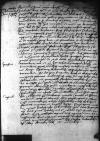Eximie Domine, amice carissime et plurimum observande, salutem Tuae Dominationi et omnia fausta precor.
Cum iste a on the margin⌈aa on the margin⌉ serenissimo written over i⌈ioo written over i⌉ ⌊rege written over is⌈isee written over is⌉ meo written over i⌈ioo written over i⌉⌋ ⌊cubicularius⌋ cum litteris ad ⌊s(acratissimam) caesaream maiestatem⌋ proficiscatur, non potui pro mea in Dominationem Tuam benevolentia et pro mutuae amicitiae nostrae iure committere, quin te his inviserem et meum in te amorem, qui ab eo tempore, quo inter nos coepit, in dies apud me fit auctior, testarer. Eoque fretus hunc cubicularium cum negotiis serenissimi ⌊regis mei⌋, quibus te affectum cognovi semper, commendandum tibi duxi impense a te rogans, quae tua est prudentia et in rebus bene expendendis dexteritas, negotium hoc banni contra nepotem et principem subiectum serenissimi regis mei sic apud ⌊serenissimam maiestatem caesaream⌋ temperare velis, ne ex ulteriori camerae imperialis processu his periculosis ob religionis diversitatem temporibus quippiam gravius, quod principum in sese animos exacerbare posset, oriretur, ne et in hoc orbis nostri angulo turbae et tumultus, quos iam passim on the margin⌈passimpassim on the margin⌉ ubique misceri audimus, cum magno ⌊reipublicae Christianae⌋ detrimento atque discrimine excitarentur. Quod te pro singulari tua in dirigendis negotiis peritia iudicioque cum acri, tum etiam longe prospiciente, non gravate facturum confido. Qua in re a Deo, qui pacem nobis dedit et amare praecepit, praemium divinamque gratiam mereberis meque tibi, non parum prius devinctum, reddes obligatissimum.
Vale quam diutissime, mi carissime Domine Doctor, meique ut apud te et apud on the margin⌈apudapud on the margin⌉ ⌊dominos commendatorem maiorem Covos⌋ et ⌊Granvelanum⌋ atque, si commode fieri posset, apud ⌊serenissimam maiestatem caesaream⌋ mentionem aliquando observantiae meae debitam facias, maiorem in modum rogo. Quae apud nos in novis habemus, iste cubicularius, quem Tua Dominatio, quaeso, cum litteris, quas habet, ad ⌊serenissimam maiestatem caesaream⌋ ducat, referet. Quae vobiscum apud vos aguntur, me vicissim Dominatio Tua copiose certiorem reddat meque, quo coepit, amore prosequatur.

 AAWO, AB, D. 67, f. 291 r
AAWO, AB, D. 67, f. 291 r